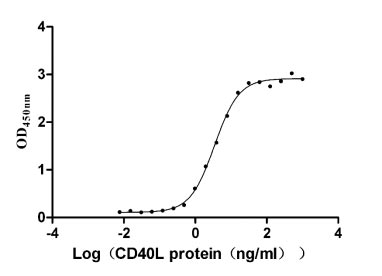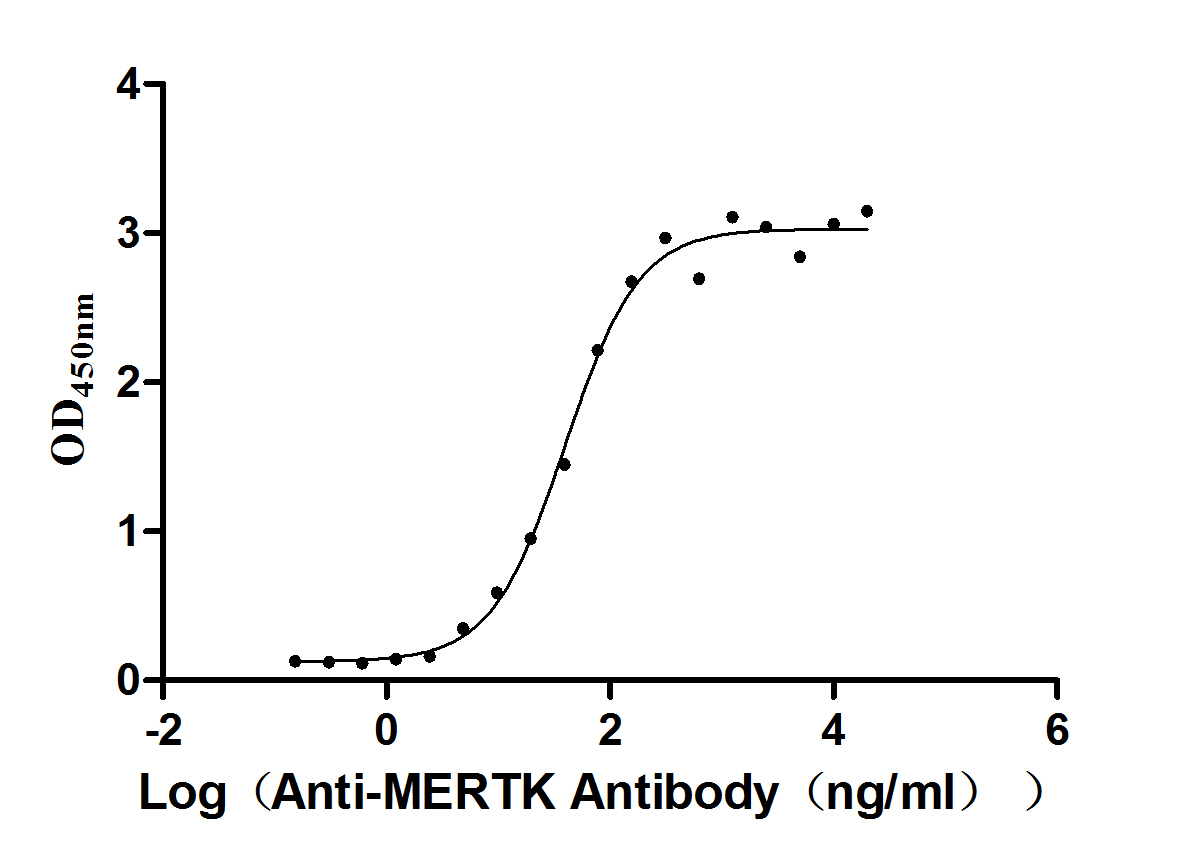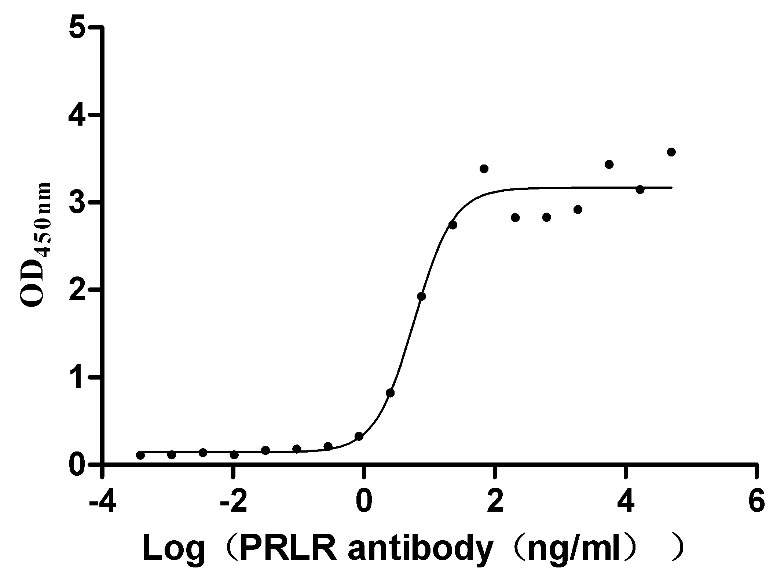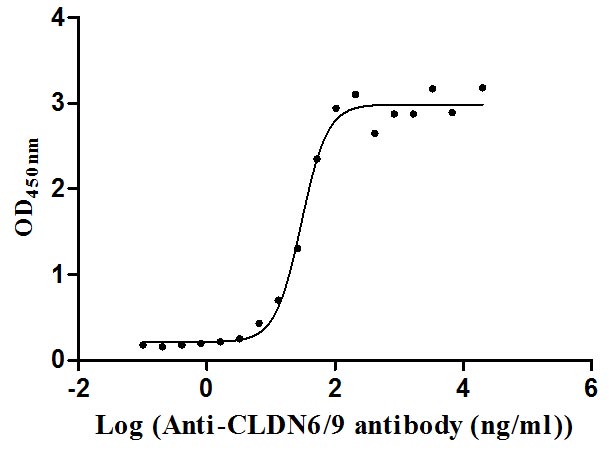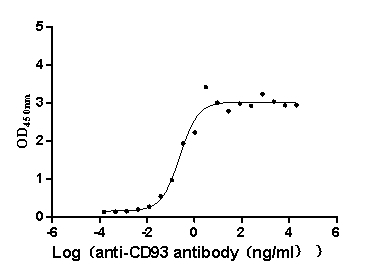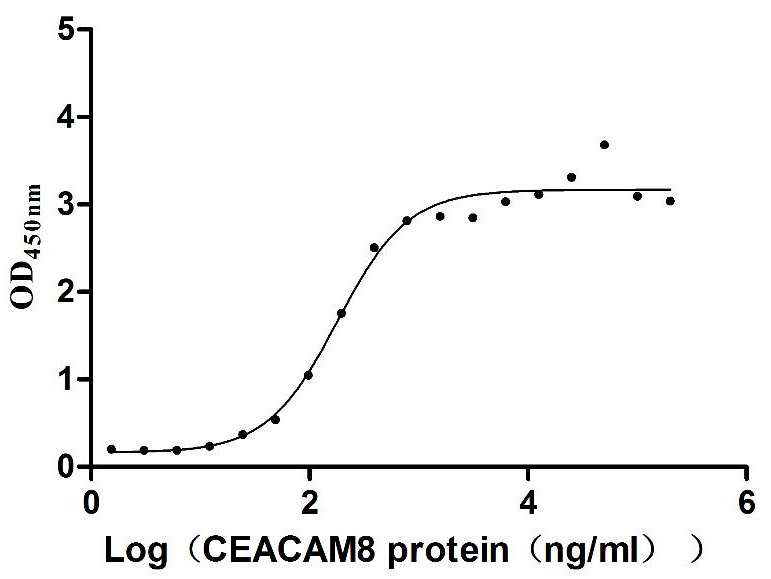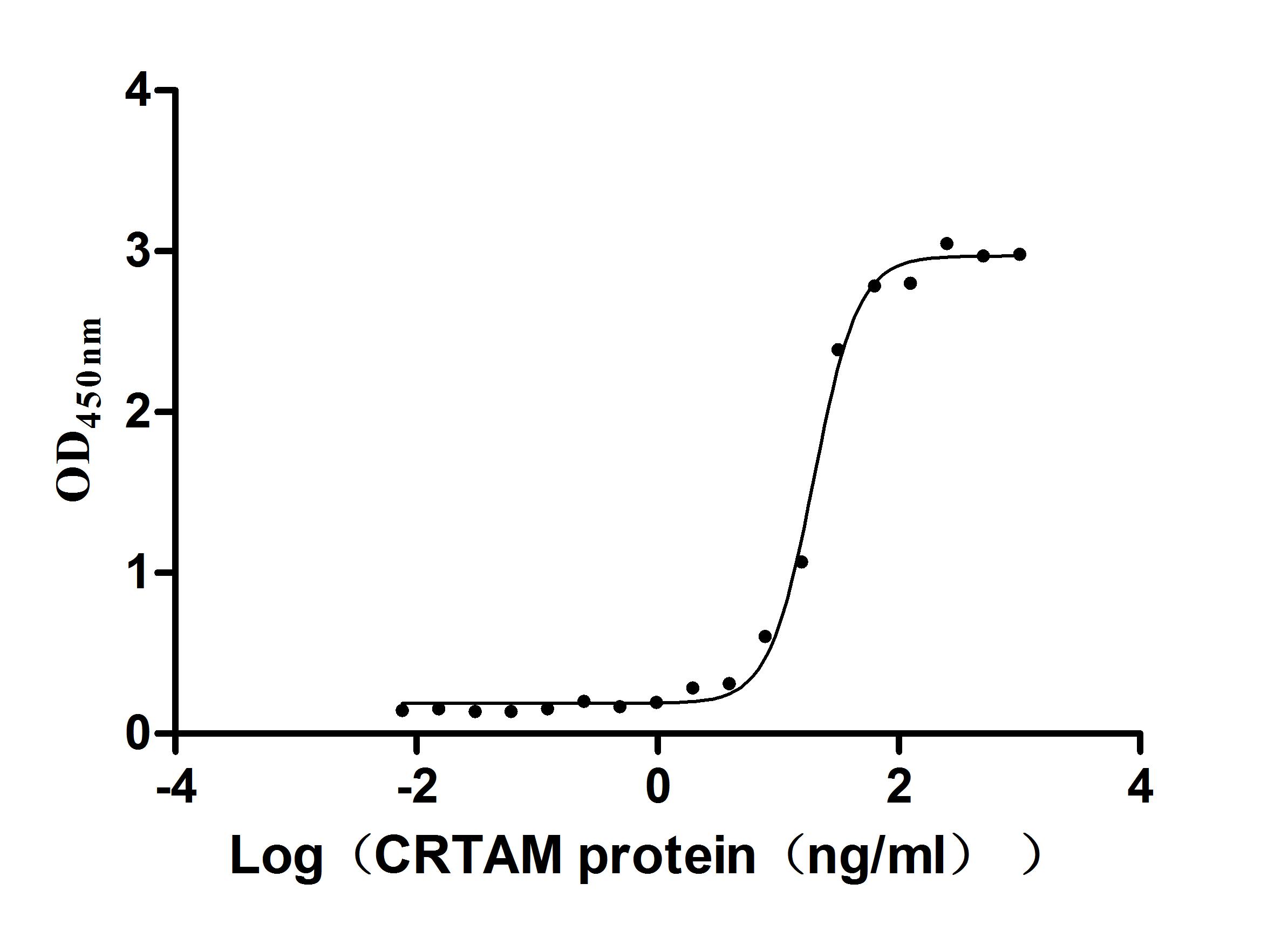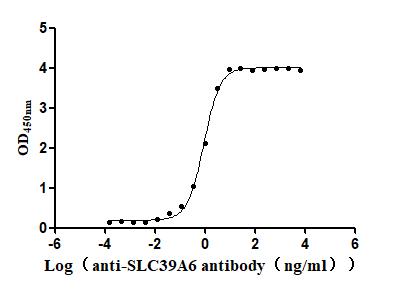Recombinant Human Krueppel-like factor 15 (KLF15)
-
货号:CSB-YP883433HU
-
规格:
-
来源:Yeast
-
其他:
-
货号:CSB-EP883433HU
-
规格:
-
来源:E.coli
-
其他:
-
货号:CSB-EP883433HU-B
-
规格:
-
来源:E.coli
-
共轭:Avi-tag Biotinylated
E. coli biotin ligase (BirA) is highly specific in covalently attaching biotin to the 15 amino acid AviTag peptide. This recombinant protein was biotinylated in vivo by AviTag-BirA technology, which method is BriA catalyzes amide linkage between the biotin and the specific lysine of the AviTag.
-
其他:
-
货号:CSB-BP883433HU
-
规格:
-
来源:Baculovirus
-
其他:
-
货号:CSB-MP883433HU
-
规格:
-
来源:Mammalian cell
-
其他:
产品详情
-
纯度:>85% (SDS-PAGE)
-
基因名:KLF15
-
Uniprot No.:
-
别名:Kidney enriched Kruppel like factor; Kidney-enriched krueppel-like factor; KKLF; KKLF protein; KLF 15; KLF15; KLF15_HUMAN; Krueppel-like factor 15; Kruppel like factor 15
-
种属:Homo sapiens (Human)
-
蛋白长度:full length protein
-
表达区域:1-416
-
氨基酸序列MVDHLLPVDE NFSSPKCPVG YLGDRLVGRR AYHMLPSPVS EDDSDASSPC SCSSPDSQAL CSCYGGGLGT ESQDSILDFL LSQATLGSGG GSGSSIGASS GPVAWGPWRR AAAPVKGEHF CLPEFPLGDP DDVPRPFQPT LEEIEEFLEE NMEPGVKEVP EGNSKDLDAC SQLSAGPHKS HLHPGSSGRE RCSPPPGGAS AGGAQGPGGG PTPDGPIPVL LQIQPVPVKQ ESGTGPASPG QAPENVKVAQ LLVNIQGQTF ALVPQVVPSS NLNLPSKFVR IAPVPIAAKP VGSGPLGPGP AGLLMGQKFP KNPAAELIKM HKCTFPGCSK MYTKSSHLKA HLRRHTGEKP FACTWPGCGW RFSRSDELSR HRRSHSGVKP YQCPVCEKKF ARSDHLSKHI KVHRFPRSSR SVRSVN
-
蛋白标签:Tag type will be determined during the manufacturing process.
The tag type will be determined during production process. If you have specified tag type, please tell us and we will develop the specified tag preferentially. -
产品提供形式:Lyophilized powder
Note: We will preferentially ship the format that we have in stock, however, if you have any special requirement for the format, please remark your requirement when placing the order, we will prepare according to your demand. -
复溶:We recommend that this vial be briefly centrifuged prior to opening to bring the contents to the bottom. Please reconstitute protein in deionized sterile water to a concentration of 0.1-1.0 mg/mL.We recommend to add 5-50% of glycerol (final concentration) and aliquot for long-term storage at -20℃/-80℃. Our default final concentration of glycerol is 50%. Customers could use it as reference.
-
储存条件:Store at -20°C/-80°C upon receipt, aliquoting is necessary for mutiple use. Avoid repeated freeze-thaw cycles.
-
保质期:The shelf life is related to many factors, storage state, buffer ingredients, storage temperature and the stability of the protein itself.
Generally, the shelf life of liquid form is 6 months at -20°C/-80°C. The shelf life of lyophilized form is 12 months at -20°C/-80°C. -
货期:Delivery time may differ from different purchasing way or location, please kindly consult your local distributors for specific delivery time.Note: All of our proteins are default shipped with normal blue ice packs, if you request to ship with dry ice, please communicate with us in advance and extra fees will be charged.
-
注意事项:Repeated freezing and thawing is not recommended. Store working aliquots at 4°C for up to one week.
-
Datasheet :Please contact us to get it.
相关产品
靶点详情
-
功能:Transcriptional regulator that binds to the GA element of the CLCNKA promoter. Binds to the KCNIP2 promoter and regulates KCNIP2 circadian expression in the heart. Is a repressor of CCN2 expression, involved in the control of cardiac fibrosis. It is also involved in the control of cardiac hypertrophy acting through the inhibition of MEF2A and GATA4. Involved in podocyte differentiation. Inhibits MYOCD activity. Is a negative regulator of TP53 acetylation. Inhibits NF-kappa-B activation through repression of EP300-dependent RELA acetylation.
-
基因功能参考文献:
- KLF15 over expression suppressed lung adenocarcinma cell growth, which was partly mediated by up-regulation of CDKN1A/p21 and CDKN2A/p15 expression. PMID: 29990857
- low expression of KLF15 was associated with chronic podocyte injury. PMID: 29901095
- the results of the present study suggested that overexpression of KLF15 in Eahy926 cells exhibited a protective effect against TNFalpha induced dysfunction via activation of Nrf2 signaling and inhibition of nuclear factor kappaB signaling. PMID: 29956764
- This review provides a summary of the experimental and human studies that have investigated the role of KLF15 in the development of cardiac hypertrophy. [review] PMID: 29702551
- analysis of the role of KLF15 in type 2 diabetes patients with left ventricle hypertrophy (LVH) has really advanced the importance of KLF15 in the physiology and pathophysiology of cardiac conditions, and also promoted us to understand the mechanism of type 2 diabetes-induced LVH. All these will lay a theoretical foundation for the potentially clinical prevention and treatment of LVH. PMID: 28499925
- The KLF15 SNP rs9838915 A allele was associated in a dominant manner with Left ventricular mass before and after adjustment for age, gender, body mass index and hypertension, and with adjusted septal and posterior wall thickness. PMID: 28400202
- KLF15 activates SOX9 expression directly. SOX9 is involved in KLF15 function during chondrogenic differentiation. PMID: 28923246
- study identifies novel genes associated with insulin sensitivity in adipocytes in women independently of obesity. KFL15 and SLC25A10 are inhibitors of insulin-stimulated lipogenesis under conditions when glucose transport is the rate limiting step PMID: 28570579
- In general, our study revealed that KLF15 is dramatically down-regulated in GC tissues and cell lines and that KLF15 is negatively associated with aggressive clinical characteristics, such as tumor stage, lymph node metastasis, and DFS. Importantly, up-regulation of KLF15 inhibits cell proliferation by regulating CDKN1A/p21 and CDKN1C/p57. PMID: 28421457
- KLF15 is directly induced by glucocorticoids in primary human airway smooth muscle and it represses ASM hypertrophy. PMID: 28375666
- the expression of KLF15 increased in the RA-treated cells regardless of fluidic condition PMID: 28320523
- In breast cancer cells, KLF6 and KLF15 are suppressed via miR-4262. PMID: 27629257
- Findings suggest that, in obese status, the lower expression level of A2bAR, KLF4, and KLF15 of visceral adipose tissue may correlate with obese-dyslipidemia induced inflammation in Uygur population. PMID: 27199507
- Case Reports: 2 girls with primary renal myoepithelial carcinomas with a novel EWSR1-KLF15 fusion. PMID: 26523541
- Our results indicate that nuclear KLF15 expression suppresses breast cancer cell proliferation at least partially through p21 up-regulation and subsequent cell cycle arrest PMID: 25869021
- KLF15 as a key regulator of myocardial lipid utilization and is the first to implicate the KLF transcription factor family in cardiac metabolism. PMID: 24407292
- A previously unrecognized KLF15-dependent pathway regulates vascular smooth muscle cell proinflammatory activation. PMID: 23999430
- a critical role of KLF15 in mediating podocyte differentiation and in protecting podocytes against injury. PMID: 22493483
- Elucidation of this heretofore unrecognized role for KLF15 now implicates this factor as a central component of the transcriptional circuitry that coordinates physiologic flux of all three basic cellular nutrients: glucose, amino acids, and lipids PMID: 22493257
- Nitrogen homeostasis exhibits circadian rhythmicity, and is orchestrated by Kruppel-like factor 15. PMID: 22405069
- serves as a molecular link between myogenic factors and the activity of the D4Z4 enhancer, and it thus contributes to the overexpression of the DUX4c and FRG2 genes during normal myogenic differentiation and in FSHD. PMID: 21937448
- the GR target, Klf15, has a role in modulating airway function PMID: 21257922
- Kruppel-like factor 15 activates hepatitis B virus gene expression and replication. PMID: 21503941
- Glucocorticoid receptors promote adipogenesis via KLF15 gene expression as a transcriptional direct target. PMID: 20956975
- KLF11, but not KLF15, was essential for UCP1 expression during brown adipocyte differentiation of muBM3.1. PMID: 20709022
- Deficiency of the transcriptional regulator Kruppel-like factor 15 (Klf15) in mice leads to both heart failure and aortic aneurysm and Klf15 concentrations are markedly reduced in failing human hearts and in human aortic aneurysm tissues. PMID: 20375365
- Both Kruppel-like factor 15 and specificity protein 1 binding motifs are essential for human LRP5 promoter activity. PMID: 20141633
- KLF15 binds to multiple 9 bp consensus sites in the Rhodospin and IRBP promoters including the CRS-1 and G-rich repressor elements. An in vivo role for KLF15 in repressing photoreceptor-specific gene expression in the inner retina is hypothesized. PMID: 15963234
- These studies identify KLF15 as part of a heretofore unrecognized pathway regulating the cardiac response to hemodynamic stress PMID: 17438289
- KLF15 is a negative regulator of connective tissue growth factor expression and cardiac fibrosis. PMID: 18586263
- KLF15 is potentially a novel link between the regulation of testosterone production and fat stores by insulin in humans. PMID: 19366843
显示更多
收起更多
-
相关疾病:KLF15 deficiency results in loss of rhythmic QT variation and abnormal heart repolarization (PubMed:22367544). It may play a role in susceptibility to ventricular arrhythmias (PubMed:22367544), and development of pathological cardiac hypertrophy leading to heart failure (PubMed:20375365).
-
亚细胞定位:Nucleus.
-
蛋白家族:Sp1 C2H2-type zinc-finger protein family
-
组织特异性:Highly expressed in liver, skeletal muscle, and kidney. Expressed in cardiomyocytes. Expression is highly reduced in cardiac tissue of patients with non-ischemic cardiomyopathy and aortic aneurysm, and in glomerular disease. Not expressed in bone marrow o
-
数据库链接:
HGNC: 14536
OMIM: 606465
KEGG: hsa:28999
STRING: 9606.ENSP00000296233
UniGene: Hs.272215
Most popular with customers
-
Recombinant Human Tumor necrosis factor receptor superfamily member 5 (CD40), partial (Active)
Express system: Mammalian cell
Species: Homo sapiens (Human)
-
Recombinant Human Tyrosine-protein kinase Mer (MERTK), partial (Active)
Express system: Mammalian cell
Species: Homo sapiens (Human)
-
Recombinant Mouse Prolactin receptor (Prlr), partial (Active)
Express system: Mammalian cell
Species: Mus musculus (Mouse)
-
Recombinant Human Claudin-9 (CLDN9)-VLPs (Active)
Express system: Mammalian cell
Species: Homo sapiens (Human)
-
Recombinant Macaca fascicularis CD93 molecule (CD93), partial (Active)
Express system: Mammalian cell
Species: Macaca fascicularis (Crab-eating macaque) (Cynomolgus monkey)
-
Recombinant Human Carcinoembryonic antigen-related cell adhesion molecule 6 (CEACAM6) (Active)
Express system: Mammalian cell
Species: Homo sapiens (Human)
-
Recombinant Human Cell adhesion molecule 1 (CADM1), partial (Active)
Express system: Mammalian cell
Species: Homo sapiens (Human)
-
Recombinant Macaca fascicularis Zinc transporter ZIP6 isoform X1(SLC39A6),partial (Active)
Express system: Baculovirus
Species: Macaca fascicularis (Crab-eating macaque) (Cynomolgus monkey)


